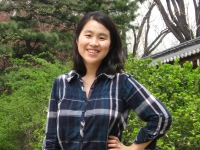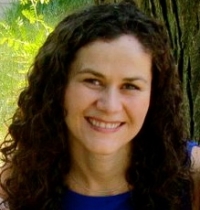The
graduate student fellows
for the 2013-14 Cultures of Law program are:
Hee Jung Choi (Anthropology)
Katherine Flowers (English and Writing Studies)
Mark Frank (East Asian Languages and Cultures)
Heather Freund (History)
Sally Heinzel (History)
Ligia Mihut (English).
Hee Jung Choi, Anthropology

In my dissertation, I aim to understand the tension and change in cultures of citizenship arising from globalization. More specifically, I attempt to show how transnational people who move back and forth and live in between try to balance their global ambitions with their determination and needs to maintain a strong sense of national identity. To these ends, my dissertation draws on the lens of transnational South Korean men most of whom spent much of their youth abroad, asking how they manage their compulsory military obligation in light of South Korea's hegemonic masculine citizenship and in relation to their own neoliberal and global subjectivities. In my work, I examine citizenship both as a legal category and as a cultural/national identity for transnational South Korean men. It is an ethnographic study of how transnational South Korean young men who have studied or lived abroad negotiate between their two-year compulsory military service and their global trajectories, with particular attention to policies and legal contexts of how the South Korean laws and the South Korean Military Manpower Administration (MMA) manages masculine citizenship in an increasingly global and diverse South Korea.
Katherine Flowers, Engish and Writing Studies

My research explores how legal texts both influence and are influenced by language practices. More specifically, I look at shifting relationships between language policies and the people who create, negotiate, and contest those policies. I am most interested in language policies that are connected to moments of emerging, contested nationalism. I am currently studying the rise of localized Official English policies in the US, drawing on theories and methods from English, writing studies, rhetoric, sociolinguistics, and linguistic anthropology. I am focusing on how people in small towns construe the relationships between Official English policies and other circulating discourses and ideologies about language, citizenship, the local, and the nation. I hope to develop new ways of understanding not just local language policies, but, more broadly, how language and the law affect each other dialogically, across multiple scales and semiotics.
Mark Frank, East Asian Languages and Cultures

My study looks at the Sino-Tibetan border region of Kham during one of the most chaotic periods in its history—the aftermath of the Qing empire's Gaitu Guiliu program, which aimed to violently overthrow powerful local chieftains and regularize much of the region under Chinese administrations. A significant result of this program was the problem of overlapping justice systems, each suited to a unique set of cultural expectations and modes of production. I focus on the administration of the short-lived Xikang Special Administrative District (Xikang tebie xingzheng qu) in Kham during the early twentieth century, with an emphasis on violence and the prosecution of murder cases. I argue that Chinese perceptions of criminality in Kham were intimately related to differences in spatial practices between the largely transhumant population of this region and the sedentary populations of the Republic of China's administrative capitals. My study will critically assess how mobile modes of production related to sedentarist understandings of war and crime.
Heather Freund, History

I am a historian of eighteenth century Britain and Empire, particularly after 1760. My work examines evolving definitions of subjecthood, citizenship, liberty, and rights in this period both within the British Empire and in other national and imperial contexts. I am interested in legal pluralism in colonies that changed from French or Spanish to British rule and debates on the differences in law and rights between Britain and its colonies. I also examine how people challenged and sought to broaden categories of subjecthood and citizenship during the Age of Revolutions as print culture and participants in revolutions spread ideologies focused on liberty, equality, and rights from America and other revolutionary theaters to different parts of Europe and the Caribbean.
Sally Heinzel, History

My dissertation examines the effect of the U.S. Civil War on race relations in Illinois. Emancipation forced the North to grapple with the meaning of and limits to freedom. The war not only reshaped the racial beliefs of Illinois soldiers serving on the frontline, but it also destabilized a discriminatory legal code at home. I argue that the war engendered a reassessment of racial beliefs among white Illinoisans, resulting in the repeal of laws that excluded African Americans physically from the state and ideologically from civic membership. Moreover, as the war progressed, many foreign-born soldiers and civilians came to understand the war in the context of their home countries' political struggles for freedom. These transnational views of liberty, combined with narratives of American exceptionalism, helped bring about popular support for abolishing statutes that denied natural rights to Illinois' black population. This was an essential step in paving the way for black citizenship during Reconstruction, even as Illinoisans continued to contest the social and political rights attendant to that status.
Ligia Mihut, English

My dissertation project explores the transnational literate experience of Romanian immigrants in the U.S. as it is shaped by languages of institutions and nation-states. In the context of transnationalism, which foregrounds economic, cultural and political attachments to more than one nation-state, I explore three different problem domains for immigrants: the issue of language, of legal papers and education. I approach these topics from a dual perspective: in terms of expectations of the host country and of the country of last residence. This approach challenges a conception of immigration solely in terms of transgression or illegality and it proposes an understanding of immigration through mediated actions of immigrants who perceive cultures of law and state powers, as systems that can be altered, through social ties, language of affinity and collective knowledge. Thus, I argue that immigrants act as literacy brokers—defined as agents of language and textual mediation, softening the rigid profiles of nation-states and bureaucratic practices. In this project, I rely on ethnographic research conducted in an immigrant community in the Midwest and archival documents pertaining to Romanian emigration in the 1970s and 1980s. As such, my project foregrounds the perspective of Eastern European immigrants, as particular case of mobile identity as they strategically broker closed borders (Cold War period), visa requirements, European Union requirements, and U.S. immigration qualifications.
